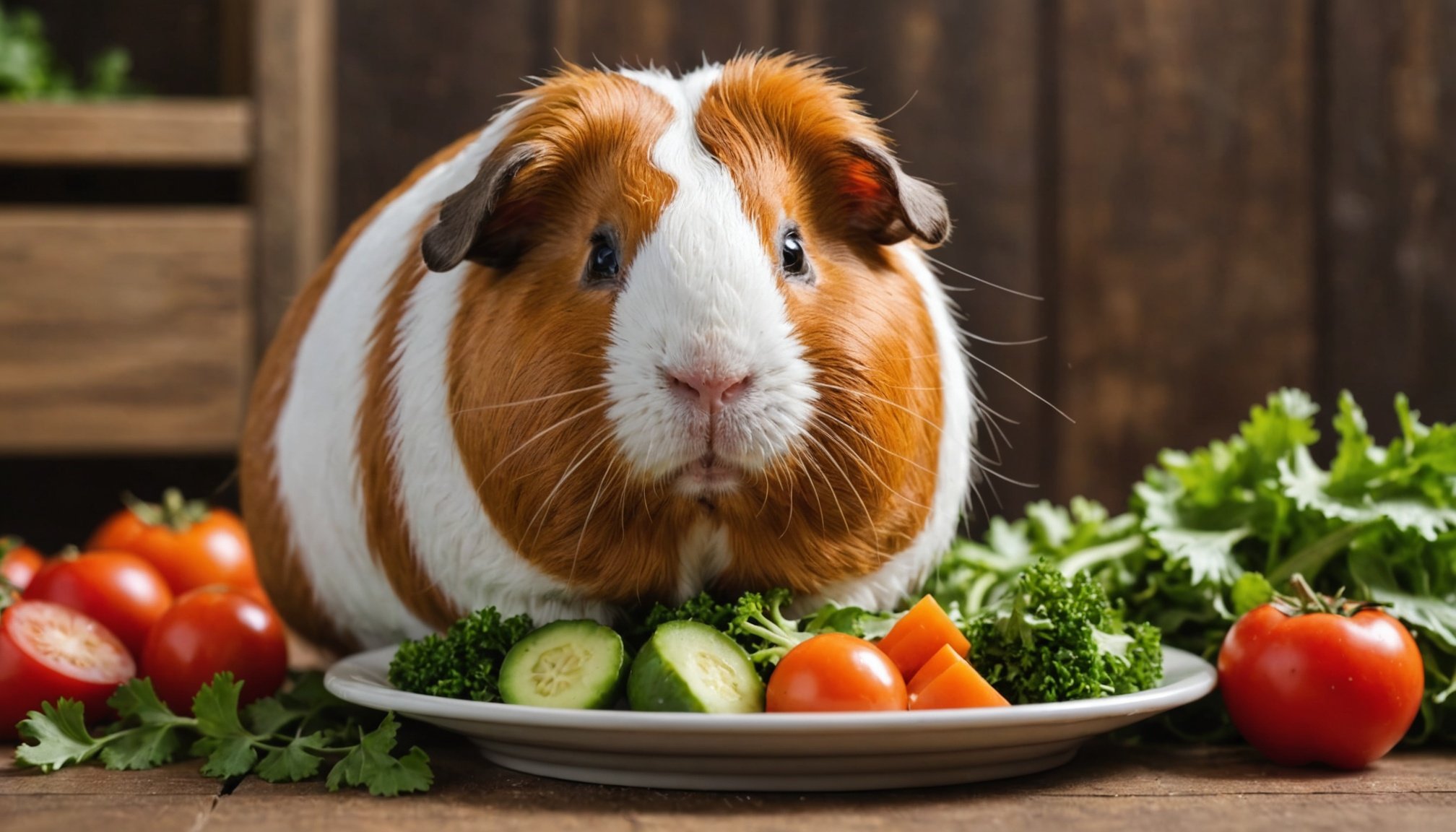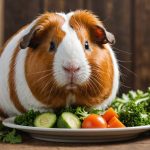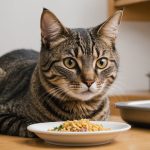Nourishing your guinea pig with a healthy vegetarian diet is essential for their happiness and longevity. These adorable companions thrive on fresh veggies and hay, but knowing which foods are safe and nutritious can be overwhelming. Simple guidelines can transform mealtime into a delightful experience for both of you. Discover how to create a balanced menu that caters to their needs, ensuring they stay energetic and vibrant while enjoying every bite. Your furry friend deserves the best—let’s embark on this flavorful journey together!
Understanding Guinea Pig Nutritional Needs
Exploring the dietary requirements of guinea pigs is crucial for their well-being.
A découvrir également : Effective Strategies to Alleviate Separation Anxiety in Your Rescued British Shorthair
Overview of Guinea Pig Dietary Essentials
Guinea pig nutrition is centered around a balance of essential nutrients. A typical diet includes fresh vegetables, specialized pellets, and an abundance of hay. Hay is not just a staple; it's vital for their digestive system, providing the fiber necessary for optimal gut health.
Importance of Vitamin C in Their Diet
One of the most critical nutrients is Vitamin C. Guinea pigs cannot synthesize this vitamin on their own, making it an indispensable component of their diet. A deficiency can lead to severe health issues such as scurvy. Therefore, incorporating foods rich in Vitamin C, like bell peppers and leafy greens, is essential.
Avez-vous vu cela : Effective Strategies to Alleviate Separation Anxiety in Your Rescued British Shorthair
Role of Fiber and Hay in Digestive Health
Fiber, primarily sourced from hay, plays a pivotal role in maintaining digestive health. It prevents gastrointestinal problems and keeps their teeth from overgrowing.
- Essential Nutrients for Guinea Pigs:
- Fresh Vegetables
- High-Fiber Hay
- Vitamin C-Rich Foods
By understanding these dietary needs, guinea pig owners can ensure their pets lead healthy, happy lives. Prioritizing these elements in their diet is not just beneficial; it's necessary for their overall health.
Recommended Foods for a Healthy Vegetarian Diet
Understanding the dietary needs of guinea pigs ensures their well-being and happiness.
List of Safe Vegetables
Guinea pigs thrive on a variety of safe vegetables. These include leafy greens like romaine lettuce and kale, which are rich in essential nutrients. Carrots and cucumbers also make excellent additions but should be given in moderation due to their higher sugar content. Consistent variety is key, as it prevents nutritional deficiencies.
- Romaine Lettuce
- Kale
- Carrots (in moderation)
- Cucumbers (in moderation)
Recommended Fruits in Moderation
While fruits are not a staple, they can be delightful healthy treats. Apples, strawberries, and blueberries are safe options, but they should be offered sparingly due to their sugar levels. A small piece once in a while is enough to satisfy their sweet tooth without compromising their health.
Safe Treat Options
Beyond fruits and vegetables, consider other safe treat options. Hay-based treats or those specially formulated for guinea pigs provide a fun and healthy variety. These treats support dental health while ensuring your pet receives a balanced diet. Always prioritize treats that align with their vegetarian diet to maintain optimal health.
Portion Sizes and Feeding Guidelines
Understanding how to manage portion control is crucial for maintaining a guinea pig's health.
Daily Portion Recommendations
Guinea pigs thrive when their diet management includes precise portion control. An adult guinea pig should consume approximately 1/8 cup of specialized pellets daily. Fresh vegetables should be provided in a cup-sized portion, emphasizing variety to ensure balanced nutrition. Hay, being the cornerstone of their diet, must be available at all times.
Ideal Feeding Schedule
Establishing a consistent feeding frequency is vital. Guinea pigs benefit from a regular schedule, ideally being fed twice a day. This routine helps in managing their diet effectively and ensures they receive nutrients throughout the day. Consistency in feeding times can also reduce stress and promote better eating habits.
Monitoring Weight and Health
Regularly monitoring your guinea pig's weight is an integral part of effective diet management. Weigh your guinea pig weekly to detect any significant changes. Adjust portion sizes accordingly to maintain a healthy weight. Observing their eating habits and energy levels is also essential for ensuring their overall well-being.
- Pellets: 1/8 cup daily
- Vegetables: 1 cup daily
- Feeding Frequency: Twice daily
Implementing these guidelines facilitates a balanced diet, promoting a long and healthy life for your guinea pig.
Introducing New Foods Safely
Understanding the importance of a safe dietary transition is crucial.
Steps to Introduce New Vegetables
Introducing new vegetables to a guinea pig's diet requires careful consideration. Start by offering a small piece of the new vegetable alongside their regular diet. Monitor their reaction over several days. Gradually increase the portion if no adverse reactions occur. This method ensures a smooth dietary transition without overwhelming their digestive system.
Signs of Food Intolerance or Allergies
Recognizing signs of food intolerance or allergies is essential. Symptoms may include diarrhea, bloating, or changes in behavior. If any of these occur, discontinue the new food immediately and consult a veterinarian. Understanding these signs helps in making informed decisions about their diet.
Importance of Gradual Changes in Diet
Gradual changes in diet are vital for maintaining digestive health. Sudden changes can upset their stomach, leading to stress and potential health issues. A slow, methodical approach allows their system to adjust, ensuring a successful dietary transition.
- Introduce new foods slowly
- Monitor for intolerance signs
- Ensure gradual dietary changes
Implementing these safe practices promotes a healthy and balanced diet, supporting the overall well-being of your guinea pig.
Common Dietary Pitfalls to Avoid
Understanding the risks is crucial for optimal guinea pig care.
Foods That Are Toxic or Harmful
Certain foods pose significant health concerns for guinea pigs. Avoid feeding them chocolate, onions, and garlic, as these are toxic. Similarly, iceberg lettuce can cause digestive issues due to its high-water content and low nutritional value. Always ensure that any food given is safe and suitable for guinea pig consumption to prevent potential dietary mistakes.
Risks of Overfeeding Certain Vegetables and Fruits
Overfeeding can lead to serious dietary issues. Vegetables like carrots and fruits such as grapes, while nutritious, should be given in moderation due to their sugar content. Excessive sugar intake can cause obesity and other health concerns. Balance is key in guinea pig care, ensuring they receive the right nutrients without overindulgence.
Recognizing Symptoms of Dietary Issues
Being vigilant about dietary mistakes is essential. Watch for symptoms like diarrhea, lethargy, or changes in appetite, which can indicate dietary issues. Early detection allows for swift action, reducing health concerns. Consulting a veterinarian if symptoms persist is advised to ensure the well-being of your pet.
- Avoid toxic foods
- Moderate high-sugar veggies/fruits
- Monitor for dietary symptoms
Implementing these strategies helps maintain a healthy diet, preventing common pitfalls in guinea pig care.
Addressing Health Concerns Related to Vegetarian Diets
Understanding potential health issues is crucial for guinea pig care.
Common Health Problems Linked to Poor Nutrition
Guinea pigs can suffer from various health issues due to inadequate nutrition. Common problems include Vitamin C deficiency, leading to scurvy, and obesity from overfeeding sugary fruits. Insufficient fiber can result in gastrointestinal stasis, a serious condition affecting their digestive system. Regularly evaluating your guinea pig's diet is crucial to prevent these issues.
Preventative Measures to Ensure a Balanced Diet
Preventative care is essential in maintaining a balanced diet. Ensure a diet rich in essential nutrients like fiber and Vitamin C. Regularly provide fresh vegetables and hay. Implement portion control to avoid overfeeding. A balanced diet not only prevents health issues but also promotes longevity and vitality.
- Provide high-fiber hay
- Include Vitamin C-rich foods
- Monitor portion sizes
When to Consult a Veterinarian About Dietary Concerns
Consulting a veterinarian is recommended if you notice symptoms of dietary problems. Signs such as weight loss, diarrhea, or lethargy warrant professional advice. Veterinarians can offer tailored guidance to address specific dietary concerns and improve your pet’s overall health. Regular check-ups are a proactive approach to catching potential health issues early.










